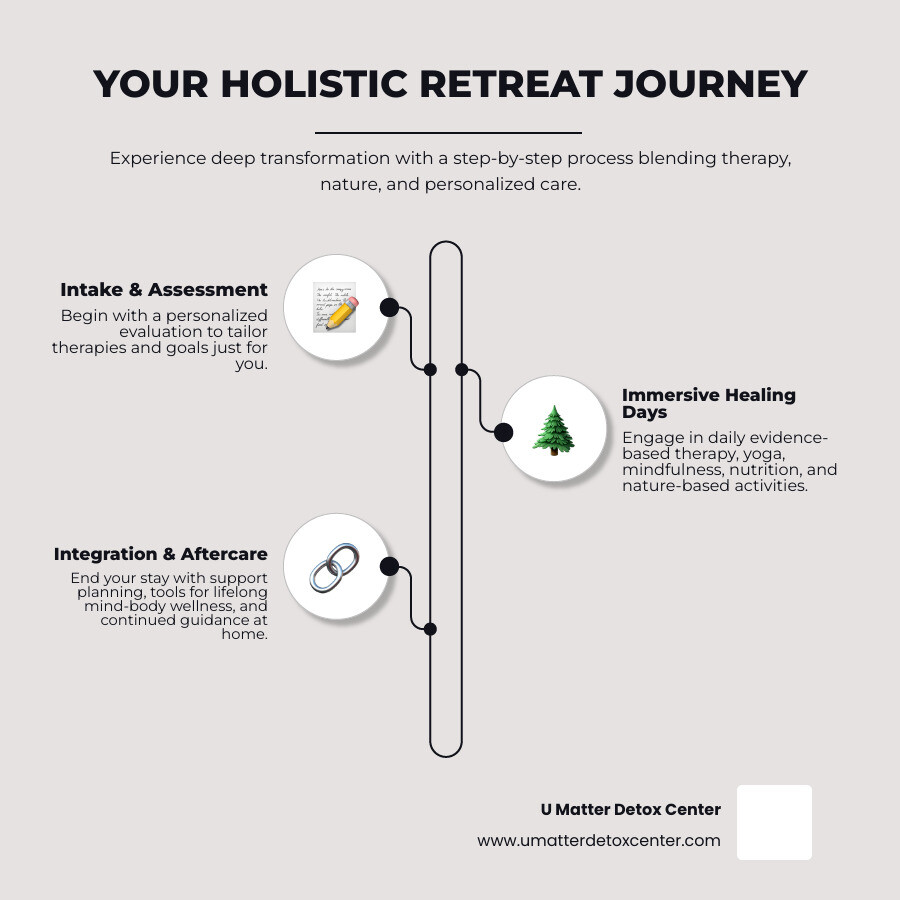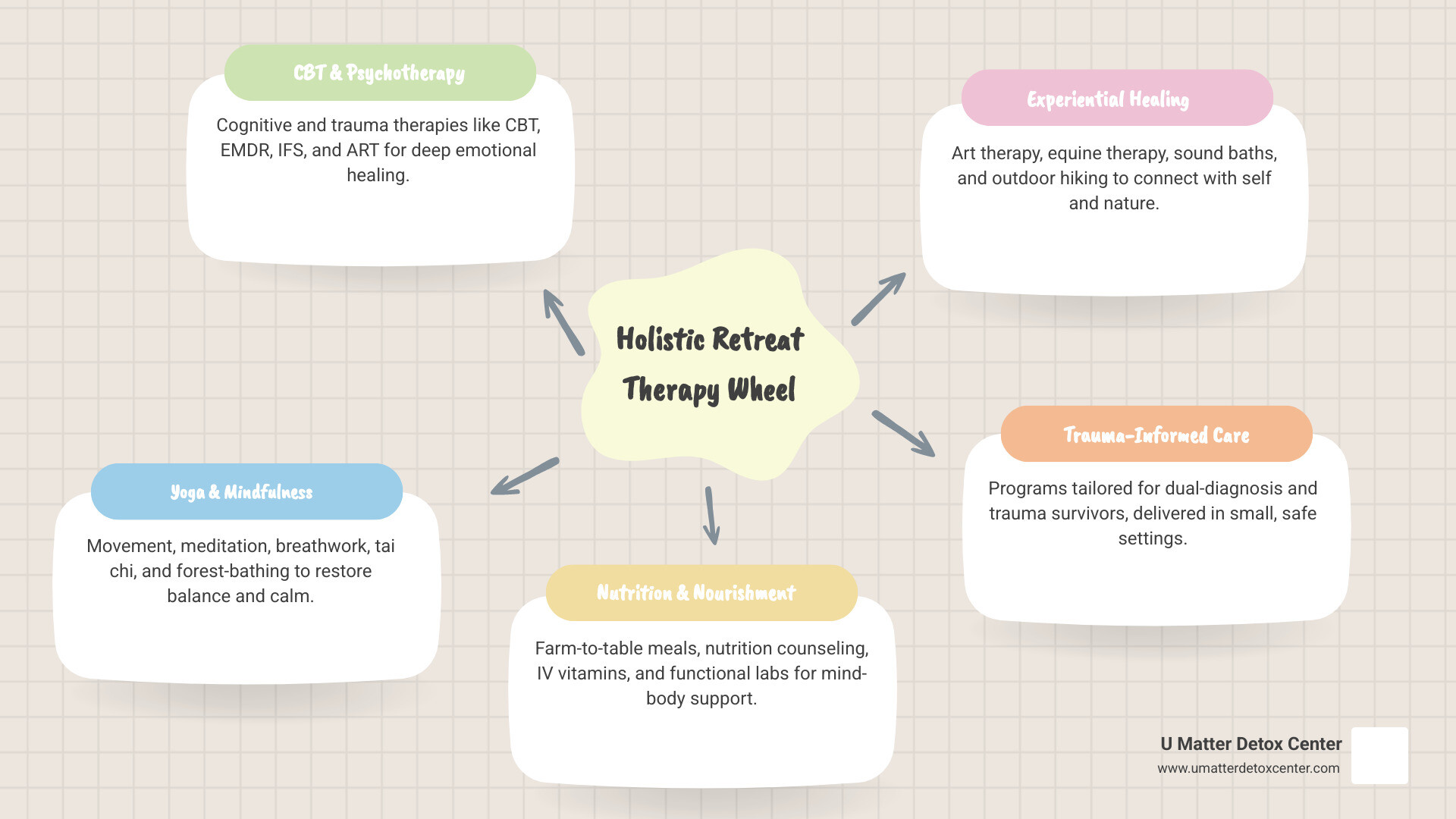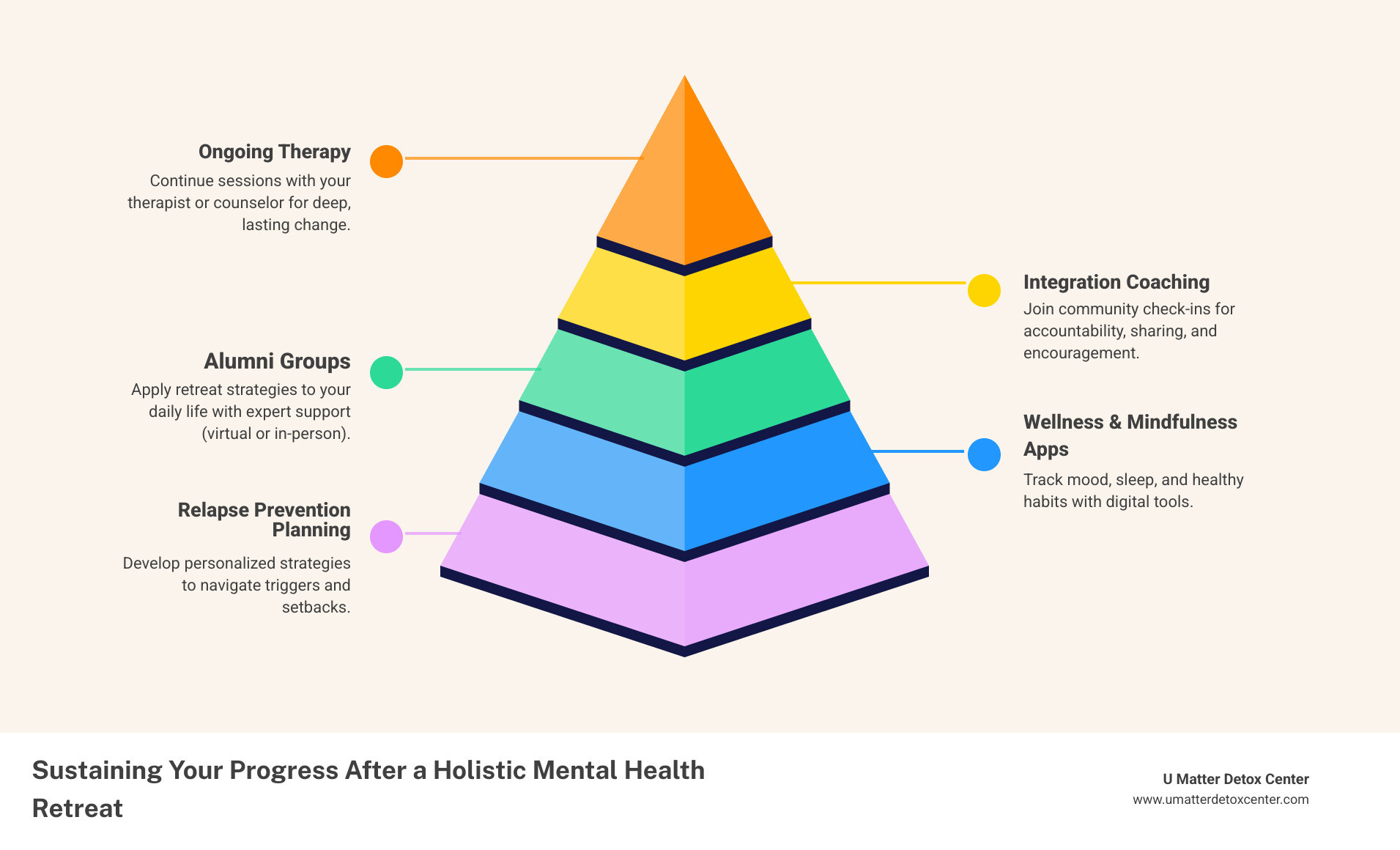The Fast Track Guide: What Is a Holistic Mental Health Retreat?
If you’re curious about a holistic mental health retreat, here’s the quick answer:
A holistic mental health retreat is an immersive, residential program designed to heal your mind, body, and spirit—all at once. These retreats combine evidence-based therapy, activities like yoga and meditation, healthy nutrition, and deep nature immersion to help reduce anxiety, burnout, and substance use. The experience is private, luxurious, and custom for lasting change, especially for high-stress professionals looking for real change.
Key Features of a Holistic Mental Health Retreat:
| What You Get | Why It Matters |
|---|---|
| Personalized therapy (CBT, DBT, EMDR) | Addresses root mental health issues |
| Yoga, meditation, breathwork | Calms anxiety and boosts resilience |
| Nutrition and wellness focus | Restores depleted energy |
| Nature immersion | Promotes deep, natural healing |
| Luxury, privacy, small groups | Ensures comfort and confidentiality |
| Trauma-informed care | Supports recovery from past wounds |
| Aftercare & follow-up | Sustains improvements long-term |
"Resetting your mental and physical health sometimes requires more than a 20-minute meditation session or a sweaty HIIT class."
—Travel + Leisure, on the power of immersive wellness retreats
One in five adults in the U.S. faces a mental health challenge each year. Many find that holistic retreats offer the privacy, depth, and mind-body reset that standard outpatient or hospital programs just can’t match.
Below, we’ll break down the purpose, therapies, and life-changing advantages of holistic mental health retreats—plus how to choose and prepare for the right one.

What Is a Holistic Mental Health Retreat?
A holistic mental health retreat is your chance to hit the reset button on your entire well-being—not just your symptoms. Think of it as the difference between putting a band-aid on a wound versus actually healing it from the inside out.
These retreats treat the whole person, which means they're looking at your mind, body, and spirit all at once. While traditional mental health centers often focus on managing symptoms with medication or weekly therapy sessions, holistic retreats take a completely different approach.
The difference is pretty striking when you compare them side by side:
| Holistic Retreats | Traditional Centers |
|---|---|
| Mind-body-spirit integration | Primarily mind-focused |
| Nature immersion, luxury, and privacy | Hospital or clinic setting |
| Personalized, trauma-informed, and dual-diagnosis care | One-size-fits-all or diagnosis-driven |
| Evidence-based + holistic therapies (yoga, nutrition) | Medication management, talk therapy |
| Emphasis on aftercare and long-term change | Discharge with referrals |
What makes holistic retreats especially powerful is their ability to help people with dual-diagnosis situations—when you're dealing with both mental health challenges and substance use issues. They're also incredible for trauma survivors and anyone who feels like they've tried everything else but still aren't getting the lasting change they're looking for.
The beauty of this approach is that it recognizes something important: your anxiety doesn't exist in a vacuum. Your depression isn't separate from your physical health. Your trauma affects your whole being, so your healing should too.
Roots in Whole-Person Healing
The holistic approach isn't some new-age trend—it's actually rooted in some of the world's oldest and most respected healing traditions, combined with cutting-edge modern science.
Ayurveda and integrative medicine have been treating people as whole beings for thousands of years. These ancient systems understand that true health comes from balance across your body, mind, and spirit. Many holistic retreats weave in Ayurvedic principles through personalized nutrition plans, herbal remedies, and lifestyle guidance that actually makes sense for your unique situation.
The mindfulness lineage brings us practices like meditation, breathwork, and yoga—techniques that have been helping people find peace and resilience for centuries. The beautiful thing is that modern science has now proven what these traditions always knew: these practices literally change your brain in ways that improve mood, focus, and your ability to handle stress.
Western integrative psychiatry is where the magic really happens though. The best holistic retreats don't ask you to choose between ancient wisdom and modern medicine. Instead, they blend proven clinical therapies like CBT, DBT, and EMDR with alternative modalities like acupuncture and sound healing.
This combination gives you the best of both worlds—the scientific rigor you need for real, lasting change, plus the gentle, nurturing approaches that help your whole being heal.
Core Components & Therapies
What actually happens on a holistic mental health retreat? Picture yourself surrounded by nature, participating in a carefully designed blend of therapies that work together to heal your mind, body, and spirit.
Your days might begin with gentle yoga as the sun rises, followed by individual CBT sessions to work through anxiety patterns. After a nourishing farm-to-table lunch, you might experience EMDR therapy to process trauma, then end the day with sound healing under the stars.
This isn't random—it's strategic. Evidence-based psychotherapy forms the clinical backbone, including approaches like Cognitive Behavioral Therapy (CBT), Dialectical Behavioral Therapy (DBT), Eye Movement Desensitization & Reprocessing (EMDR), Internal Family Systems (IFS), and Accelerated Resolution Therapy (ART). These proven methods help rewire thought patterns and process difficult emotions.
But here's where holistic retreats shine—they don't stop at talk therapy. Movement and mindfulness practices like meditation, breathwork, and forest-bathing help calm your nervous system in ways that words alone cannot. Experiential therapies such as equine therapy and art therapy tap into healing through connection and creativity.
The body gets attention too. Nutrition counseling and IV vitamin therapy address the physical depletion that often accompanies mental health struggles. Many people don't realize how much gut health, vitamin deficiencies, and blood sugar swings affect mood and anxiety.

Movement & Mindfulness Modalities
Don't worry—if "yoga" makes you think of pretzel poses and Sanskrit chanting, most retreat yoga is nothing like that. These practices are adapted for real people dealing with real stress.
Yoga at holistic retreats focuses on gentle movement and breath awareness. It's less about perfect poses and more about reconnecting with your body after months or years of living in your head. Tai chi offers similar benefits through slow, flowing movements that feel more like meditation than exercise.
Breathwork (also called pranayama) might sound simple, but it's surprisingly powerful. Learning to control your breath gives you a tool to manage panic attacks, insomnia, and racing thoughts—skills you'll use long after you leave.
Forest-bathing involves guided walks where you're encouraged to really notice nature—the sound of leaves, the smell of pine, the feeling of bark under your palm. Research shows this practice can lower stress hormones and blood pressure within minutes.
Silence practice and digital detox periods give your overstimulated mind a chance to rest and reset. Many guests say these quiet moments are when their biggest breakthroughs happen.
Science-Backed Psychotherapies
Just because a retreat is "holistic" doesn't mean it skips the proven stuff. Licensed therapists lead sessions using therapies with solid research behind them.
CBT helps you identify the thought patterns that fuel anxiety and depression, then teaches you how to challenge and change them. DBT goes deeper into emotional regulation—especially helpful if you struggle with intense feelings or relationship conflicts.
EMDR uses bilateral stimulation (like following a light with your eyes) while processing traumatic memories. It sounds weird, but it works remarkably well for trauma and PTSD. Internal Family Systems (IFS) helps you understand the different "parts" of yourself—the inner critic, the people-pleaser, the rebel—and find more balance.
Accelerated Resolution Therapy combines elements of several approaches for rapid relief from trauma and anxiety. Many people see significant improvement in just a few sessions.
Nourishment, Nature & Nervous System Reset
Your brain can't heal if your body is running on empty. That's why nutrition plays a huge role in holistic mental health retreats.
Farm-to-table meals aren't just trendy—they're designed to stabilize blood sugar, support neurotransmitter production, and reduce inflammation. Many guests are surprised how much better they feel when they're eating real food instead of surviving on coffee and takeout.
Functional lab testing might reveal vitamin deficiencies, hormone imbalances, or gut issues that have been sabotaging your mental health. IV vitamin therapy can quickly replenish depleted nutrients, especially if you've been dealing with chronic stress or substance use.
Nature immersion happens throughout your stay—hiking forest trails, cold-plunge therapy in natural springs, or simply eating meals outdoors. There's something about being surrounded by green space that helps your nervous system remember how to relax.
For more insights on natural healing approaches, check out our guide: Holistic Rehab Havens That Help You Kick Addiction Naturally.
Who Should Attend & What to Expect
Wondering if a holistic mental health retreat is right for you? If you’re feeling burned out, caught in a cycle of anxiety or depression, or struggling after a tough season of life, you’re in good company. Many people who come to our retreats are searching for more than just a quick fix—they want deep rest, real change, and a gentle reset for mind, body, and spirit. Maybe you’re craving privacy and peace after years of holding it together for everyone else, or maybe you’re simply ready for a new approach that actually works.
At U Matter Detox Center, we welcome guests from all walks of life. Some are busy executives who need confidential support away from the spotlight. Others are caregivers, nurses, or healthcare pros who’ve given so much to others, they’ve run out of fuel for themselves. We also serve trauma survivors, and those facing both mental health and substance use challenges (what’s known as co-occurring or dual-diagnosis). If you've tried outpatient therapy or even relapsed but want a fresh start in a nurturing environment, you’ll find a safe, supportive space here.
What sets a holistic mental health retreat apart is the personalized treatment journey. From the moment you arrive, your experience is custom to you. First comes a thorough intake assessment, looking at mental, physical, and nutritional health—because we know everything in your life is connected. Together, we’ll set clear, realistic goals, whether that’s managing anxiety, working through trauma, or building resilience for everyday life.
Your daily schedule is custom-built to suit your needs and comfort level. You’ll experience a mix of individual therapy, small-group sessions, movement and mindfulness practices, nature time, and plenty of space for reflection. As you progress, our team checks in often to adjust your plan, making sure it always fits your unique journey.
We don’t just wave goodbye when your retreat ends, either. Before you leave, we’ll help you craft a post-retreat integration plan—think coaching, support groups, wellness apps, or referrals to outpatient care—so you have ongoing support back home. For a closer look at what your days might look like, check out What to Expect at a Holistic Detox Center: Therapies, Benefits, and Results.
A holistic mental health retreat is about so much more than just “checking out” for a week. It’s a real opportunity to restore energy, find clarity, and refind the healthiest, happiest version of yourself—all in a setting where you truly matter.
Preparing, Choosing, and Booking
Let’s be honest—finding the right holistic mental health retreat isn’t just about picking a place with pretty views. It’s about making sure your next step is safe, supportive, and truly transformative. With so many options out there, doing a little homework goes a long way.

How to Select the Right Holistic Mental Health Retreat
Start by thinking about location. A peaceful spot in nature can make a world of difference—imagine waking up to birdsong instead of traffic. Consider climate, travel time, and how private you want your experience to be.
Next, look at the length of stay. Some retreats offer quick, three-day getaways for a gentle reset, while others run longer—30 days or more—for deeper healing. Research suggests a longer stay can lead to bigger, more lasting changes, but it has to fit your life.
Don’t be shy about checking therapist credentials and the staff-to-guest ratio. At a high-quality retreat, you’ll work with licensed therapists and trauma-informed professionals who can personalize care. Ask about accreditation and licensing—it’s your peace of mind.
Insurance acceptance is another important piece. Many retreats, including ours, work with private PPO plans. Always double-check what your policy covers before you book—no one likes surprises (unless it’s a massage).
Think about the cultural fit too. Does the retreat’s approach feel right to you? Is their blend of therapies, group size, and daily structure aligned with your needs?
Before you say “yes,” make sure you’ve gotten answers to questions like:
- Which therapies and activities are part of the program?
- Who leads both the clinical and holistic sessions, and what are their qualifications?
- How will your treatment plan be personalized?
- Is there aftercare or an alumni group to support you post-retreat?
- What’s the guest-to-staff ratio?
- How are medical emergencies handled?
- Does the program take your insurance?
- How is your privacy protected?
- Will there be device-free or digital detox periods?
- What should you pack?
Getting Ready Physically & Mentally
Once you’ve chosen your holistic mental health retreat, a little preparation will help you get the most out of your stay.
First, get medical clearance if you have ongoing health conditions or take medication. It keeps you safe, and your providers informed.
Journaling before you go is a great way to clarify your goals, intentions, and maybe even spot some patterns you want to change. You don’t need to be Shakespeare—just be honest.
Try to ease into a device-detox by reducing screen time in the days before you leave. Your mind will thank you.
When it comes to packing, think comfort and practicality. Bring comfy clothes, outdoor gear, a journal, a reusable water bottle, and any medications you need. (And yes, your favorite hoodie is a wellness item.)
Finally, remember: healing is a journey, not a sprint. Arrive with compassion for yourself and an open mind. Every step, even the wobbly ones, is part of the process.
For more tips on preparing for a retreat, check out Escape the Chaos with These Blissful Holistic Detox Retreats.
Sustaining the Zen: Aftercare & Long-Term Outcomes
The real magic of a holistic mental health retreat starts to shine after you’ve left the comfort of the retreat grounds. Lasting wellness isn’t just about what happens during your stay—it’s about how you carry that peace and clarity into your daily life.

At U Matter Detox Center, we know that your journey doesn’t end at checkout. You’ll go home with new skills, a clearer mind, and a lighter heart—but you’ll also get real-world support to keep you on track. Our aftercare options are designed to help you build your strongest, happiest self, day after day.
You might start with integration coaching—one-on-one support, offered virtually or in person. This is your chance to talk through challenges, reinforce coping skills, and keep your progress alive. Many of our guests love the sense of belonging in our alumni groups, where you can connect and share with others who truly get it.
Staying on top of your well-being is much easier with a little tech help. We recommend wellness and mindfulness apps to track your mood, sleep, and daily habits. For those who have struggled with addiction or dual diagnoses, we also guide you through relapse-prevention planning. This means you’ll leave with a clear, step-by-step plan—and the support to follow it.
Measuring Success & Staying on Track
So, how do you know if your holistic mental health retreat experience is working long-term? We use a mix of compassion and science. Tools like the PHQ-9 Depression Scale, anxiety check-ins, and sleep or mood trackers help you see your growth in black and white. Journaling about your progress, noticing how your habits are changing, and staying in touch through regular follow-ups all help you celebrate wins and spot trouble early.
Long-term support makes all the difference. Whether you’re using an app, joining a group hike, or just checking in with a coach, it’s all about building on what you started at the retreat. Healing is a journey, not a finish line—and we’re here with you, every step of the way.
If you’re ready to keep the calm going strong, or just want to see what the next step might look like, explore more on our site or reach out to our team. Your story of renewal is just getting started.
Frequently Asked Questions
You probably have questions about holistic mental health retreats—and that's completely normal. These programs are still relatively new to many people, even though they're incredibly effective. Let's tackle the most common concerns we hear.
How long does a holistic mental health retreat last?
Holistic mental health retreats can range anywhere from intensive 3-day programs to comprehensive 30-day (or longer) residential experiences. But here's what we've learned from years of helping people heal: time matters.
While a weekend retreat might give you some great tools and perspective, research shows that meaningful, lasting change typically requires at least 7–14 days. Think about it—you're not just learning new coping skills, you're literally rewiring your brain and nervous system.
For dual-diagnosis situations (where mental health and substance use intersect) or complex trauma, 30 days is often the gold standard. This gives your mind and body enough time to detox, process, learn new patterns, and start integrating them into daily life. It's like the difference between a quick tune-up and a complete engine rebuild.
Does insurance cover holistic retreat programs?
This is probably our most asked question, and the answer might surprise you: many private PPO insurance plans do cover holistic mental health retreats. The key is finding programs that are led by licensed clinicians and offer evidence-based therapies alongside the holistic modalities.
Insurance companies are getting smarter about recognizing that intensive, residential programs often save money in the long run by preventing relapses and repeated hospitalizations. CBT, DBT, EMDR, and other therapies we use are well-established treatments that insurers regularly cover.
That said, coverage varies wildly between plans and providers. We always recommend verifying your benefits before booking—and we're happy to help with that process. Don't let insurance concerns stop you from exploring your options.
Can retreats address trauma and PTSD effectively?
Absolutely. In fact, holistic mental health retreats can be particularly powerful for trauma survivors because they address the whole person—not just the symptoms in your head.
Modern retreats use trauma-informed care as their foundation, meaning every interaction is designed with safety and healing in mind. We incorporate proven therapies like EMDR, Accelerated Resolution Therapy (ART), and Internal Family Systems (IFS)—all of which have strong research backing for reducing PTSD symptoms.
But here's what makes holistic retreats special for trauma work: the small-group settings and emphasis on privacy create a much safer container than traditional group therapy. Plus, practices like yoga, breathwork, and nature immersion help regulate your nervous system in ways that talk therapy alone sometimes can't reach.
Many trauma survivors tell us they finally felt heard, safe, and hopeful again after years of struggling with traditional approaches. The combination of clinical expertise and holistic healing creates space for the kind of deep work that changes lives.
Conclusion
At U Matter Detox Center, we know that true healing is more than a quick fix—it’s a journey of mind, body, and spirit working together in harmony. Our holistic mental health retreat experiences are built to be more than just a time-out from everyday stress. They’re a step-by-step blueprint for real, lasting change, rooted in science, compassion, and—yes—a healthy dose of sunshine and fresh air.
Here, you’re not just another guest. You’re a person with a unique story, and we’re honored to walk beside you as you refind peace, purpose, and your best self. Whether you’re seeking relief from burnout, anxiety, trauma, or substance use, our caring team is ready to support you with a blend of trusted therapies and natural practices. We believe that everyone deserves to feel whole, and that real change happens when you nurture every part of yourself.
If you’re ready to trade burnout, stress, or old patterns for genuine peace of mind, your next step is simple. Reach out. We’ll guide you through every stage—from choosing the right retreat, to preparing, to sustaining your progress back home. Think of us as your partners in lifelong healing.
Want more inspiration? Explore Healing Holidays: Top Addiction Recovery Retreats for a Fresh Start.
We welcome guests from across Southern California, including Encino, Sherman Oaks, Hollywood Hills, Hidden Hills, Beverly Hills, Studio City, Malibu, Hollywood, Ventura, Thousand Oaks, and Los Angeles. Our luxury, holistic programs are custom to help you restore, renew, and reconnect—body, mind, and spirit.
Take the first step toward a new beginning. Let us help you find the calm, clarity, and connection you deserve with a holistic mental health retreat at U Matter Detox Center.



